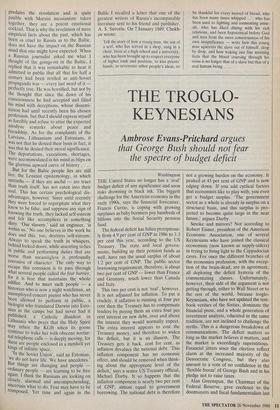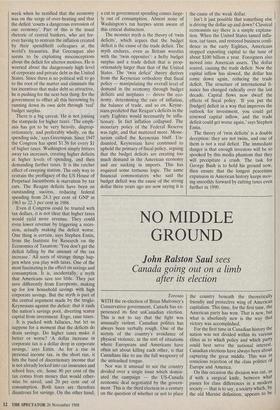THE TROGLO-
Ambrose Evans-Pritchard argues
that George Bush should not fear the spectre of budget deficit
Washington THE United States no longer has a 'real' budget deficit of any significance and soon risks drowning in black ink. The biggest challenge for the American economy in the early 1990s, says the financial forecaster, Francis Curzio, is coping with growing surpluses as baby boomers pay hundreds of billions into the Social Security pension fund.
The federal deficit has fallen precipitous- ly froni 4.9 per cent of GNP in 1986 to 3.3 per cent this year, according to the US Treasury. The state and local govern- ments, building up their pension funds as well, have run the usual surplus of about 1.2 per cent of GNP. The public sector borrowing requirement, therefore, is about two per cent of GNP — lower than France and Germany, much lower than Canada and Italy. This two per cent is not 'real', however. It is not adjusted for inflation. To put it crudely, if inflation is running at four per cent then the Treasury has to compensate lenders by paying them an extra four per cent interest on new debt, over and above the interest they would normally expect. The extra interest appears to cost the Treasury money, and therefore to widen the deficit, but it is an illusion. The Treasury gets it back, cent for cent, as inflation devalues the national debt. 'This inflation component has no economic effect, and should be removed when think- ing about the appropriate level of the deficit,' says a senior US Treasury official, Michael Darby. It so happens that the inflation component is nearly two per cent of GNP, almost equal to government borrowing. The national debt is therefore not a growing burden on the economy. It peaked at 43 per cent of GNP and is now edging down. If you add cyclical factors that economists like to play with, you even get a budget surplus. 'The government sector, as a whole is already in surplus on a structural basis, and this surplus is pro- jected to become quite large in the near future,' argues Darby.
Smoke and mirrors? Not according to Robert Eisner, president of the American Economic Association, one of several Keynesians who have joined the classical economists (now known as supply-siders) in trying to bring light to the Cappadocian caves. For once the different branches of the economics profession, with the excep- tion of the brain-dead, are in agreement, all deploring the deficit hysteria of the commentating classes. Unfortunately, however, their side of the argument is not getting through, either to Wall Street or to the rest of the world, because troglo- Keynesians, who have not updated the text- book verities of the Sixties, dominate the financial press, and a whole generation of investment analysts, educated in the same tradition, are not inclined to challenge the myths. This is a dangerous breakdown of communications. The deficit matters so long as the market believes it matters, and the market is exceedingly superstitious. Financial jitters since the election reflect alarm at the increased majority of the Democratic Congress, but they also amount to a vote of no confidence in the `flexible freeze' of George Bush and in his pledge not to raise taxes.
Alan Greenspan, the Chairman of the Federal Reserve, gave credence to the doomsayers and fiscal fundamentalists last week when he testified that the economy was on the verge of over-heating and that the deficit 'courts a dangerous corrosion of our economy'. Part of this is the usual rhetoric of central bankers, who are for- ever having to restrain the inflation created by their spendthrift colleagues at the world's treasuries. But Greenspan also seems to be exploiting misconceptions about the deficit for ulterior motives. He is worried about the dangerously high level of corporate and private debt in the United States. Since there is no political will to go to the root of the matter and eliminate the tax incentives that make debt so attractive, he is pushing for the next best thing: for the government to offset all this borrowing by running down its own debt through 'real' budget surplus.
There is a big caveat. He is not joining the stampede for higher taxes. 'The emph- asis has got to be very heavily, disprop- ortionately, and preferably wholly, on the spending side,' says Greenspan. Since 1947 the Congress has spent $1.56 for every $1 of higher taxes. Washington simply fritters away tax increases, creating higher deficits at higher levels of spending, and then demanding further taxes. It is the ratchet effect of creeping statism. The only way to restrain the profligacy of the US House of Perpetual Incumbents is starvation by tax cuts. The Reagan deficits have been an outstanding success, reducing federal spending from 24.3 per cent of GNP in 1963 to 22.3 per cent in 1988.
Even if Congress could be trusted with tax dollars, it is not clear that higher taxes would yield more revenue. They could even lower revenue by triggering a reces- sion, actually making the deficit worse. One thing is certain, says Stephen Entin, from the Institute for Research on the Economics of Taxation: 'You don't get the deficit falling by the amount of the tax increase.' All sorts of strange things hap- pen when you play with taxes. One of the most fascinating is the effect on savings and consumption. It is, incidentally, a - myth that Americans save too little. They just save differently from Europeans, making up for low household savings with high corporate savings. But the myth is part of the central argument made by the troglo- Keynesians against the deficit: that it raids the nation's savings pool, diverting scarce capital from investment. Ergo, raise taxes.
It is packed with fallacies, but let us suppose for a moment that the deficits do drain savings. Do higher taxes make it better or worse? 'A dollar increase in corporate tax is a dollar drop in corporate savings,' says Entin. As for a rise in personal income tax, in the short run, it hits the band of discretionary income that is not already locked into car insurance and school fees, etc. Some 80 per cent of the tax comes from money that would other- wise be saved, and 20 per cent out of consumption. Both taxes are therefore disastrous for savings. On the other hand, a cut in government spending comes large- ly out of consumption. Almost none of Washington's tax harpies seem aware of this critical distinction.
The monster myth is the theory of 'twin deficits', which argues that the budget deficit is the cause of the trade deficit. The myth endures, even as Britain wrestles with the 'twin opposites': a hefty budget surplus and a trade deficit that is prop- ortionately larger than that of the United States. The 'twin deficit' theory derives from the Keynesian orthodoxy that fiscal policy — manipulating the overall level of demand in the economy through budget deficits and surpluses — drives the eco- nomy, determining the rate of inflation, the balance of trade, and so on. Keyne- sians predicted that Reagan's deficits in the early Eighties would necessarily be infla- tionary. In fact inflation collapsed. The monetary policy of the Federal Reserve was tight, and that mattered more. Mone- tarism called the Keynesian bluff. Un- daunted, Keynesians have continued to uphold the primacy of fiscal policy, arguing that the budget deficits are creating too much demand in the American economy and are sucking in imports. This has required some tortuous logic. The same financial commentators who said the budget deficit was the cause of the strong dollar three years ago are now saying it is the cause of the weak dollar.
Isn't it just possible that something else is driving the dollar up and down? Classical economists say there is a simple explana- tion. When the United States tamed infla- tion, cut taxes, and restored business confi- dence in the early Eighties, Americans stopped exporting capital to the tune of about $100 billion a year. Foreigners also moved into American assets. The dollar soared, causing the trade deficit. Now the capital inflow has slowed, the dollar has come down again, reducing the trade deficit. The structure of international fi- nance has changed radically over the last decade. Capital flows now dwarf the effects of fiscal policy. 'If you put the [budget] deficit in a way that improves the outlook for investment, you could get renewed capital inflow, and the trade deficit could get worse again,' says Stephen Entin.
The theory of 'twin deficits' is a double deception: they are not twins, and one of them is not a real deficit. The immediate danger is that enough investors will be so spooked by this media phantom that they will precipitate a crash. The task for George Bush is to hold his ground now, then ensure that the longest peacetime expansion in American history keeps mov- ing smoothly forward by cutting taxes even further in 1990.











































































 Previous page
Previous page